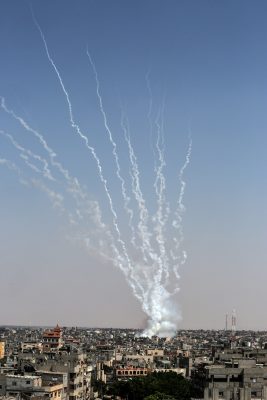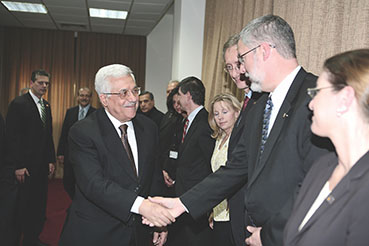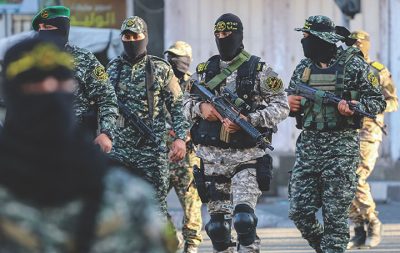
by: Kate Norman, BFP Staff Writer
 People often talk about the two-state solution to the Israeli–Palestinian conflict. It’s simple, they argue. Divide up the land. Allow Israel to keep a portion of it, and give the other portion to the Palestinians—including eastern Jerusalem, Gaza and a large parcel of Judea and Samaria.
People often talk about the two-state solution to the Israeli–Palestinian conflict. It’s simple, they argue. Divide up the land. Allow Israel to keep a portion of it, and give the other portion to the Palestinians—including eastern Jerusalem, Gaza and a large parcel of Judea and Samaria.
These are actually the terms the Jewish leaders agreed to before the Jewish state declared independence on May 14, 1948. The Arabs, however, rejected the United Nations resolution that sparked Israel’s rebirth, and on May 15, 1948, armies from Egypt, Iraq, Jordan, Lebanon and Syria invaded the newborn state, opening the defensive War of Independence—which Israel miraculously won.
Yet 75 years later, world leaders continue to tout the two-state solution, arguing that it will bring the elusive peace to the Middle East.
There is one obvious problem to this supposed solution that gets overlooked: who would be Israel’s partner in the two-state solution? There is no sole leader or representative of the Palestinian people who can step into the role as ruler of the Palestinian state—and Israel’s partner for peace.
In fact, there are several players vying for the Palestinian throne, including the Palestinian Authority (PA), Hamas and the Palestinian Islamic Jihad (PIJ).

The Oslo Accords, signed between Israel and the Palestine Liberation Organization (PLO) in the 1990s, gave birth to the PA, the “temporary” government of the Palestinian people until the conclusion of the two-state solution.
Ruling from Ramallah in Judea and Samaria, the PA is struggling to hold on to its power as PA President Mahmoud Abbas serves out the 18th year of his four-year term. Dominated by the secular Fatah political party, the PA has marked its years with mismanagement and corruption—as well as inciting the Palestinian people to violence by painting Israel as the true villain and source of their problems. But after inciting the Palestinians against Israel, the PA coordinates with Israel on certain things, particularly security, leaving a bad taste in the mouth of the Palestinian people and driving them into the arms of other entities who take a more hardline stance against the Jewish state, particularly Hamas.
 mas
masThe PA’s main rival for power, Hamas is the terror organization in control of the Gaza Strip, although its influence is spreading into the biblical heartland of Israel as more young Palestinians are abandoning the PA and pledging their allegiance to Hamas.
In fact, when the PA held its last election in 2006, Hamas won the majority of seats in the Palestinian Legislative Council, the PA’s legislature. The two factions were unable to maintain a unity government, and by 2007, Hamas instituted a coup d’état in the Gaza Strip, violently expelling Fatah members.
Hamas was born in 1987 out of the Egypt-based Muslim Brotherhood. Though it is a Sunni Islamist organization, it is backed, funded and armed by Shia Iran. The goal of Hamas, as stated in its charter, is to “raise the banner of Allah over every inch of Palestine.”
The charter’s preamble states that “Israel will exist and will continue to exist until Islam will obliterate it, just as it obliterated others before it.” Hamas also refuses any peaceful agreements or negotiations with Israel, which the group’s charter calls a “contradiction to the principles of the Islamic Resistance Movement…There is no solution for the Palestinian problem except by jihad [holy war].” This does not make for a two-state peace partner with Israel.
Hamas takes its mandate of jihad seriously, plotting terror attacks against Israeli soldiers and civilians as well as launching barrages of rockets toward Israel, most recently in Operation Guardian of the Walls in May 2021. Hamas partnered with the PIJ to launch more than 4,400 rockets toward Israel over the course of 11 days, prompting retaliatory Israeli strikes.
 The PIJ is one of the relatively new power players on the scene. It is the second largest terror group operating in the Gaza Strip behind Hamas—and like Hamas, is funded, backed and armed by Iran.
The PIJ is one of the relatively new power players on the scene. It is the second largest terror group operating in the Gaza Strip behind Hamas—and like Hamas, is funded, backed and armed by Iran.
The group was established in 1981 in Gaza—also as an offshoot of the Muslim Brotherhood—with the goal to destroy Israel and establish an Islamist Palestinian state. As the group refuses to negotiate with Israel and resorts to only terrorist means, the PIJ is also an unlikely partner in a potential two-state solutions.
After partnering with Hamas in Guardian of the Walls, the PIJ proved itself a standalone threat to Israel during Operation Breaking Dawn in August 2022. Claiming an imminent attack against the Jewish state, the Israel Defense Forces (IDF) launched preemptive strikes against PIJ commanders and terror targets in the Gaza Strip. Over the three-day operation, the IDF eliminated three top PIJ commanders and the PIJ launched over 1,100 rockets toward Israel.
Then, on May 2, 2023, the PIJ launched over 21 rockets toward Israel in response for the death of a PIJ commander who had been on a hunger strike while in Israeli custody. A week later, the IDF responded by launching Operation Shield and Arrow, eliminating three more PIJ commanders in surgical strikes in Gaza. The operation lasted five days, in which the PIJ launched nearly 1,500 rockets into Israel, prompting retaliatory strikes on PIJ terror and military targets in the Strip. Hamas notably did not participate in either conflict.
With three such parties vying for the Palestinian throne, who is supposed to sit across the negotiating table with Israel for a two-state solution? The PA is slowly losing its grip on the Palestinian people, and Hamas and the PIJ refuse any sort of peace agreement with the Jewish state, seeking instead to wipe it off the map and replace it with an Islamist state. As the situation currently stands, there is no possibility of a simple two-state solution.
Photo Credit: Click on photo for photo credit
Photo License: President Mahmoud Abbas of the Palestinian Authority
All logos and trademarks in this site are property of their respective owner. All other materials are property of Bridges for Peace. Copyright © 2025.
Website Site Design by J-Town Internet Services Ltd. - Based in Jerusalem and Serving the World.